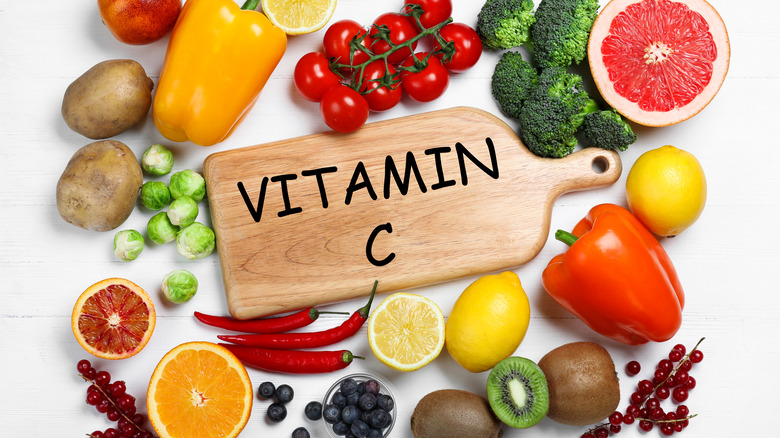Is It Really Safe To Take A Vitamin C Supplement Every Day?
The seemingly endless benefits that come from vitamin C is a hot topic (and we're not talking about the eponymous pop singer of the 1990s and her Graduation song). Stroll the beauty aisles of your local drugstore and you're sure to find facial serums, sunscreens, and hair conditioners with labels boasting their vitamin C content. And don't forget the medicine aisle. Thanks to all that advertising over the last decades touting the immune-boosting properties of Emergen-C, we now know that loading up on vitamin C when we feel a cold coming on might do our bodies good.
Vitamin C is, in fact, essential to multiple biological functions. But it just so happens that the body isn't able to produce vitamin C on its own, so we need to get it through the foods we eat (via Mayo Clinic.) A study published in National Academies Press recommends 90 milligrams of vitamin C daily for men and 75 milligrams daily for women. Unfortunately, 46% of American adults are not getting the amount they need (per Nutrients).
A vitamin supplement seems like an easy solution. But taking supplements can be tricky. Should we take higher doses of vitamin C when we're feeling under the weather? And if we think we're not consuming enough vitamin C-rich foods, is it safe to take a supplement every day?
What are the benefits of vitamin C?
A study published in Seminars in Preventive and Alternative Medicine scoured over 100 studies conducted over the last 10 years and found a wide range of benefits from vitamin C. One of the study researchers, Dr. Mark Moyad made a statement about their findings, suggesting that the more vitamin C is examined in a clinical setting, the more science is able to understand its diversity when it comes to protecting and maintaining our health — from warding off cancer and stroke to promoting heart and eye health, and even aiding in immunity and living longer (per WebMD).
According to mindbodygreen, vitamin C is working on the front lines for our bodies, seeking out free radicals and balancing oxidative stress levels by increasing our blood's antioxidant levels. It is an essential nutrient for functions like iron absorption, metabolism (turning food into energy), the production of neurotransmitters (our body's chemical messengers) and red blood cells, the synthesis and preservation of collagen, and tissue growth and repair. Whew! That's one essential vitamin. So, how do we make sure we are getting enough of it?
Do we need to supplement our vitamin C intake?
It's important to get enough vitamin C every day because your body doesn't produce it or even store it. If you're pregnant or lactating, or if you're a smoker, you need more than the Recommended Daily Allowance (RDA) (per Harvard T.H. Chan).
You should be able to get all the vitamin C you need from your diet. Citrus fruits might be the most obvious source of vitamin C, but plenty of other fruits and veggies contain a high concentration too. You can get enough vitamin C for the day in just one orange or a cup of strawberries, chopped red pepper, broccoli, or cauliflower. Leafy greens, sweet potatoes, and winter squash are also loaded with vitamin C (via Mayo Clinic).
If you suspect you're not getting enough vitamin C in your diet, then a daily supplement is a safe and easy solution. Keep in mind that loading up on vitamin C when you feel under the weather won't ward off the sniffles. "The data show that vitamin C is only marginally beneficial when it comes to the common cold," says Dr. Bruce Bistrian, chief of clinical nutrition at Harvard-affiliated Beth Israel Deaconess Medical Center, via Harvard Health Publishing. You'll do your body good if you take a daily vitamin C supplement that meets the RDA, but you don't have to go overboard. Be sure not to take more than 2,000 mg per day, in order to avoid possible headaches, nausea, vomiting, or diarrhea (per Mayo Clinic.)


